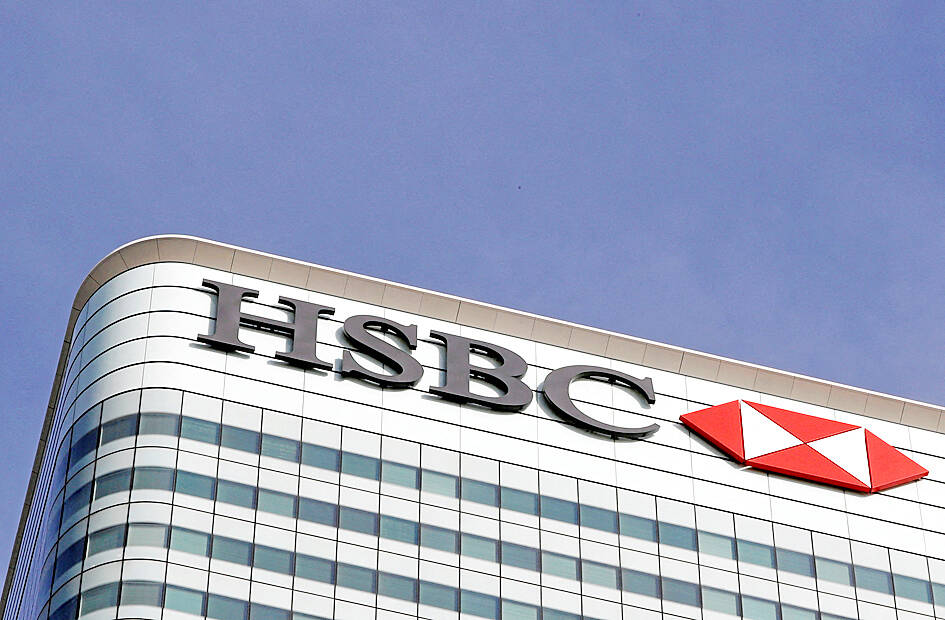Global banking giant HSBC Holdings PLC yesterday announced a surge in pretax profits to US$12.9 billion in the first quarter of this year, projecting healthy earnings for the rest of the year.
The London-headquartered bank’s first-quarter profits represented a US$9 billion jump from the same period last year.
The performance enabled HSBC to announce its first quarterly dividend since 2019, a return of US$0.10 per share, and a share buy-back of up to US$2 billion.

Photo: Reuters
“Our strong first quarter performance provides further evidence that our strategy is working,” HSBC CEO Noel Quinn said in a statement.
“Our profits were spread across our major geographies, and all three global businesses performed well as we continued to meet our customers’ needs through our internationally connected franchises,” Quinn said.
Revenue jumped 64 percent to US$20.2 billion.
The revenue spike was in part due to the reversal of an impairment related to the planned sale of its French retail banking operations, HSBC said.
Buoyed by rising global interest rates, the bank said that it expected US$34 billion in net interest income this year.
Pressure has been mounting on HSBC since its largest shareholder, Chinese insurer Ping An Insurance Group Co (平安保險集團), called for the bank to break up its business as part of a “strategic restructuring” to unlock shareholder value.
The company has urged its shareholders to vote down the proposal at its annual general meeting in Birmingham, England, scheduled for Friday.
HSBC bought the British arm of failed US lender Silicon Valley Bank (SVB) for a nominal US$1.2 in a rescue deal in March.
Quinn said the acquisition fits with the bank’s overall growth plans.
“We remain focused on continuing to improve our performance and maintaining tight cost discipline, but we also saw an opportunity to invest in SVB UK to accelerate our growth plans,” he said. “We believe they’re a natural fit for HSBC, and that we’re uniquely placed to take them global.”
Quinn has also said the SVB acquisition led HSBC to attract “significant inflows” worth billions.
The sale, overseen by the Bank of England and His Majesty’s Treasury, came hours after the collapse of the California-based SVB, one of the biggest bank failures in US history.
HSBC yesterday said in its earnings statement that an “unexpected rise in interest rates in France” has made the sale of its French retail banking operations “less certain.”
The sale of HSBC’s banking business in Canada is expected to be completed in the first quarter of next year, the bank said.
The Asia-focused financier slashed 35,000 jobs during the COVID-19 pandemic in a bid to refocus on its most profitable areas in Asia and the Middle East.

Intel Corp chief executive officer Lip-Bu Tan (陳立武) is expected to meet with Taiwanese suppliers next month in conjunction with the opening of the Computex Taipei trade show, supply chain sources said on Monday. The visit, the first for Tan to Taiwan since assuming his new post last month, would be aimed at enhancing Intel’s ties with suppliers in Taiwan as he attempts to help turn around the struggling US chipmaker, the sources said. Tan is to hold a banquet to celebrate Intel’s 40-year presence in Taiwan before Computex opens on May 20 and invite dozens of Taiwanese suppliers to exchange views

Application-specific integrated circuit designer Faraday Technology Corp (智原) yesterday said that although revenue this quarter would decline 30 percent from last quarter, it retained its full-year forecast of revenue growth of 100 percent. The company attributed the quarterly drop to a slowdown in customers’ production of chips using Faraday’s advanced packaging technology. The company is still confident about its revenue growth this year, given its strong “design-win” — or the projects it won to help customers design their chips, Faraday president Steve Wang (王國雍) told an online earnings conference. “The design-win this year is better than we expected. We believe we will win

Chizuko Kimura has become the first female sushi chef in the world to win a Michelin star, fulfilling a promise she made to her dying husband to continue his legacy. The 54-year-old Japanese chef regained the Michelin star her late husband, Shunei Kimura, won three years ago for their Sushi Shunei restaurant in Paris. For Shunei Kimura, the star was a dream come true. However, the joy was short-lived. He died from cancer just three months later in June 2022. He was 65. The following year, the restaurant in the heart of Montmartre lost its star rating. Chizuko Kimura insisted that the new star is still down

While China’s leaders use their economic and political might to fight US President Donald Trump’s trade war “to the end,” its army of social media soldiers are embarking on a more humorous campaign online. Trump’s tariff blitz has seen Washington and Beijing impose eye-watering duties on imports from the other, fanning a standoff between the economic superpowers that has sparked global recession fears and sent markets into a tailspin. Trump says his policy is a response to years of being “ripped off” by other countries and aims to bring manufacturing to the US, forcing companies to employ US workers. However, China’s online warriors